I am trying to setup https on one of my EC2 instances. I've done this many times, but for some reason, for this instance, it refuses to work.
Problem
When I connect to the domain via the local ip, the https works fine. When I connect to the domain via the public ip, the https does not work and the browser repsonse is "ERR CONNECTION REFUSED"
When I reload sometimes, you can see it accepted the https, and then it blocks it immediately, almost as if there is a firewall rule, but there isnt.
normal http works 100% local and public.
I am not blocking any ports at this stage via Security groups on amazon. I have no rules on ip tables and I have disabled ufw.
I have enabled SSL for apache and the test keys works fine locally.
This is the output of sudo netstat -tlnp
Active Internet connections (only servers)
Proto Recv-Q Send-Q Local Address Foreign Address State PID/Program name
tcp 0 0 0.0.0.0:22 0.0.0.0:* LISTEN 937/sshd
tcp 0 0 127.0.0.1:3306 0.0.0.0:* LISTEN 1060/mysqld
tcp6 0 0 :::22 :::* LISTEN 937/sshd
tcp6 0 0 :::443 :::* LISTEN 2798/apache2
tcp6 0 0 :::80 :::* LISTEN 2798/apache2
This is my /etc/apache2/ports.conf file:
Listen 80
Listen 443
I have enabled the default-ssl site without any errors.
This is my /etc/hosts file:
127.0.0.1 localhost
# The following lines are desirable for IPv6 capable hosts
::1 ip6-localhost ip6-loopback
fe00::0 ip6-localnet
ff00::0 ip6-mcastprefix
ff02::1 ip6-allnodes
ff02::2 ip6-allrouters
ff02::3 ip6-allhosts
I also tried using 0.0.0.0 instead of 127.0.0.0 and it did nothing.
This is my website's conf file for apache (I replaced my real site name with "mysite.com" for security purposes):
<VirtualHost *:80>
DocumentRoot /var/www/html/mysite.com
ServerName mysite.com
ServerAlias www.mysite.com
<Directory /var/www/html/mysite.com>
AllowOverride All
RewriteEngine On
Require all granted
Options -Indexes +FollowSymLinks
</Directory>
ErrorLog ${APACHE_LOG_DIR}/error.log
# Possible values include: debug, info, notice, warn, error, crit,
# alert, emerg.
LogLevel warn
CustomLog ${APACHE_LOG_DIR}/access.log combined
</VirtualHost>
<VirtualHost *:443>
DocumentRoot /var/www/html/mysite.com
ServerName mysite.com
ServerAlias www.mysite.com
SSLEngine on
SSLCertificateFile /usr/local/ssl/public.crt
SSLCertificateKeyFile /usr/local/ssl/private/private.key
SSLCACertificateFile /usr/local/ssl/intermediate.crt
</VirtualHost>
This exact same conf file was working on another instance, which is telling me that the problem is not with this file.
What am I missing ? Any help please. Thanks in advance
EDIT
Here are my loaded modules for apache:
sudo apache2ctl -M
Loaded Modules:
core_module (static)
so_module (static)
watchdog_module (static)
http_module (static)
log_config_module (static)
logio_module (static)
version_module (static)
unixd_module (static)
access_compat_module (shared)
alias_module (shared)
auth_basic_module (shared)
authn_core_module (shared)
authn_file_module (shared)
authz_core_module (shared)
authz_host_module (shared)
authz_user_module (shared)
autoindex_module (shared)
deflate_module (shared)
dir_module (shared)
env_module (shared)
filter_module (shared)
mime_module (shared)
mpm_prefork_module (shared)
negotiation_module (shared)
php5_module (shared)
rewrite_module (shared)
setenvif_module (shared)
socache_shmcb_module (shared)
ssl_module (shared)
status_module (shared)
wsgi_module (shared)
EDIT 2
Some interesting apache error.log entries, not when I restarted the service, just randomly a few minutes earlier (could this be whats causing the problems ?):
[Wed Feb 17 21:04:48.478106 2016] [ssl:warn] [pid 3629] AH02292: Init: Name-based SSL virtual hosts only work for clients with TLS server name indication support (RFC 4366)
[Wed Feb 17 21:04:48.507277 2016] [ssl:warn] [pid 3630] AH02292: Init: Name-based SSL virtual hosts only work for clients with TLS server name indication support (RFC 4366)
[Wed Feb 17 21:04:48.507324 2016] [:warn] [pid 3630] mod_wsgi: Compiled for Python/3.4.0.
[Wed Feb 17 21:04:48.507329 2016] [:warn] [pid 3630] mod_wsgi: Runtime using Python/3.4.3.
[Wed Feb 17 21:04:48.509502 2016] [mpm_prefork:notice] [pid 3630] AH00163: Apache/2.4.7 (Ubuntu) PHP/5.5.9-1ubuntu4.14 OpenSSL/1.0.1f mod_wsgi/3.4 Python/3.4.3 configured -- resuming normal operations
[Wed Feb 17 21:04:48.509517 2016] [core:notice] [pid 3630] AH00094: Command line: '/usr/sbin/apache2'
I disabled the wsgi module just to make sure that's not my problem, and restarted apache service, still, no luck, same problem.
EDIT 3
I'm dumping some of my phpinfo() to show more info. SSL is set to YES. I have no idea whats going on :(
EDIT 4
I think that I might need to add the SSL certifiacte on the load balancer for any of this to even work. I'm trying that now, will let everyone know...
